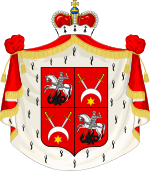Czetwertyński family
| Czetwertyński Chetvertynsky | |
|---|---|
 Coat of arms of the family | |
| Current region | Poland, Canada, Belgium |
| Place of origin | Chetvertnia, Lutsk county, Volhynia |
Czetwertyński or Chetvertynsky (also Czetwertyński-Światopełk and Sviatopolk-Chetvertynsky) is a Polish princely family of Ruthenian origin that was founded in modern-day Volhynia within the Crown of the Kingdom of Poland, now Ukraine.[1] The family takes its name from the village of Chetvertnia, Lutsk county, in modern-day Manevychi Raion, Volyn Oblast.
History[]
According to the family's legend, the progenitor of the family is the Grand Prince of Kyiv, Sviatopolk II.[1] The first documented member of the family is Oleksander Chetvertynsky, who is mentioned in 1388.[2] The family was accepted into the princely houses of Poland and Lithuania in 1569 and their Russian title of prince was confirmed in 1843.[3]
In 1492, Prince Fedir Mykhailovych Chetvertynsky was the Lithuanian-Ruthenian ambassador to Wallachia.[2] Over time, the family were Polonized and Catholicized, but some members remained adherent to the Eastern Orthodox religion.[2]
Prince Stepan Sviatopolk-Chetvertynsky (1575–1659) played a key role in re-establishing the Ukrainian Orthodox Church of the Ecumenical Patriarchate of Constantinople in 1620.[2] His son Mykola Sviatopolk-Chetvertynsky (?–1659) was a relative of the Hetman of Zaporizhian Host, Ivan Vyhovsky.[2]
Two of the most notable representatives of the family were Hedeon Zakharovych Svyatopolk-Chetvertynsky, the Metropolitan of Kyiv, Galicia and all Little Russia in 1685–90,[2] and Antoni Stanislaw's daughter Marie, who was Alexander I of Russia's mistress and had children by him. A nephew of Hedeon, Yurii Sviatopolk-Chetvertynsky (?-c. 1717–22), was a son-in-law of the Hetman of Zaporizhian Host, Ivan Samoylovych.[2]
After Antoni Stanisław Czetwertyński-Światopełk was lynched in 1794 by Polish nationals in Warsaw during the Kościuszko Uprising,[4] his family resettled in Saint Petersburg, in the Russian Empire. It received major land grants from Catherine the Great, such as the manor of Filimonki near Moscow.
Belgian branch[]
By royal decree of King Albert II of Belgium,[5] two members (both sons of Prince Michel Felix Swiatopelk-Czetwertynski) were recognised in the Belgian nobility with the rank of Prince, for them and their male-line descendants.
- Alexandre Wladimir (Alex), Prince Swiatopelk-Czetwertynski (Ukkel, 27 December 1975), married to Christine Renée Harrington
- Constantin Nicolas (Tinko), Prince Swiatopelk-Czetwertynski (Brussels, 20 February 1978), a portrait and fashion photographer known as "Tinko Czetwertynski",[6] married to model and product designer Princess Paola Maria Sapieha-Rozanska (London, 27 April 1983), daughter of Prince Jan Pavel Sapieha-Rozanski (1950-2021), former Belgian ambassador to Brazil and Princess Cristina of Orléans-Braganza (b. 1950) [7]
Coat of arms[]
The family used the Pogoń Ruska coat of arms.

Smaller coat of arms of the Czetwertyński family used in the 16th century
Notable members[]
- Antoni Stanisław Czetwertyński-Światopełk
- Gedeon Chetvertinsky, became a first Metropolitan of Kyiv appointed by Moscow in 1685
- Seweryn Franciszek Światopełk-Czetwertyński
Palaces[]

Palace in

Czetwertyńsk Palace in Grodno

Uruski Palace in Warsaw, inherited in 1931 from Countess Maria Uruska , youngest child of Count Seweryn Uruski, Sas coat of arms (1817–1890); the palace now forms the University of Warsaw
References[]
- ^ a b "Search". Encyclopædia Britannica.
- ^ a b c d e f g "Sviatopolk-Chetvertynsky". encyclopediaofukraine.com.
- ^ Enache, Nicolas. La Descendance de Marie-Therese de Habsburg. ICC, Paris, 1996. pp. 107, 115. (French). ISBN 2-908003-04-X
- ^ Kronika powstań polskich 1794–1944, Wydawnictwo Kronika, Warszawa, ISBN 83-86079-02-9, s. 38
- ^ Adelbrieven verleend door Z.M. Albert II Koning der Belgen, 2001–2008. [Tielt, 2010].
- ^ http://www.beirutlove.com/
- ^ Menthe, Caterina. 13 February 2013 Love royale. Vogue Arabia
External links[]
- Czetwertyński
- Belgian noble families
- Roman Catholic families
- Polish nobility
- Lithuanian nobility
- Belarusian nobility




